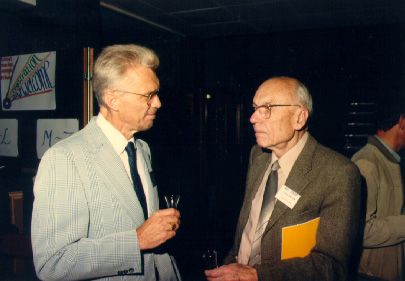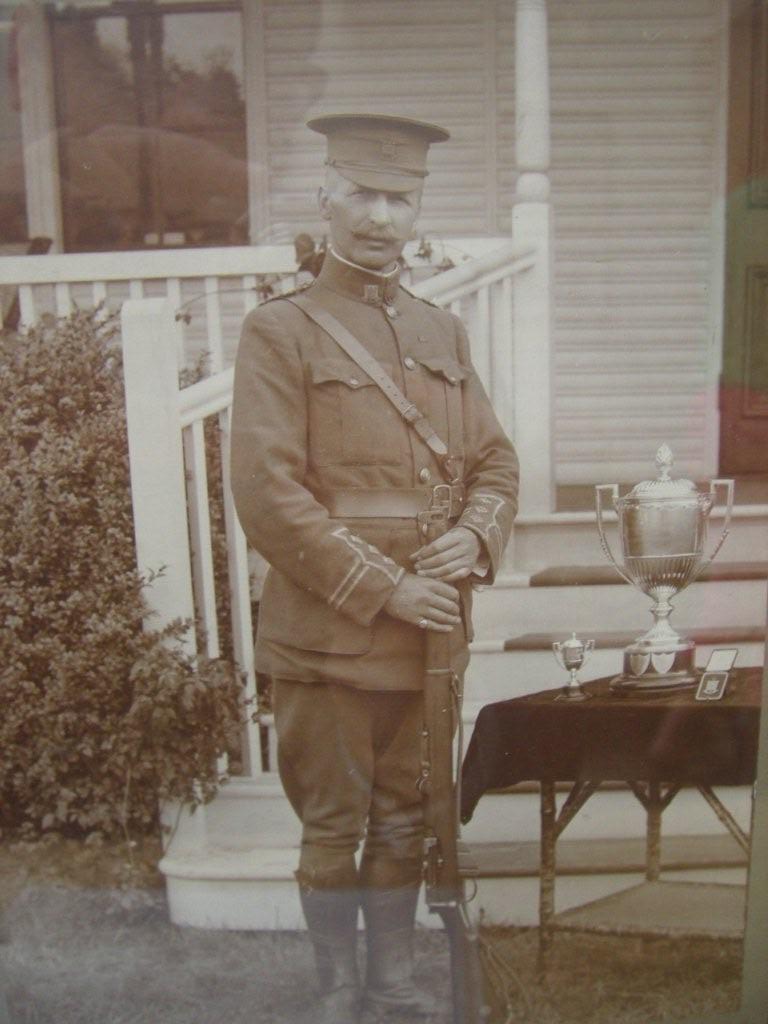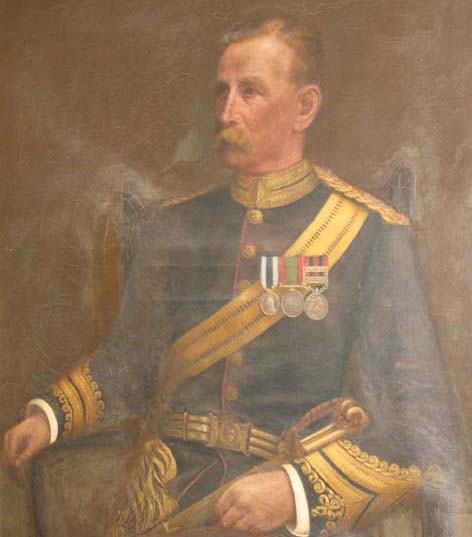|
PROFESSOR GEORGE CUNLIFFE McVITTIE Professor G.C. McVittie with Donald Clayton at 'Comet Sample Return
Mission'
Photo courtesy of Clemson University and Donald Clayton. From the Independent Friday 11 March 1988 - Obituary "Professor G C McVittie had a unique career as a leading academic in British mathematics and in American astronomy. George Cunliffe McVittie was born in 1904 in Smyrna (Ismir) where his father was in business; his mother came of an intellectually distinguished Greek family. He and his brother, who subsequently had a notable record in the diplomatic service, were educated at home, and were bilingual in English and French. From 1923 to 1928, McVittie read mathematics and natural philosophy at Edinburgh, in the heyday of these subjects at the University under Professors E.T. Whittaker and C.G. Darwin. McVittie started research in relativity theory with Whittaker and from 1928 to 1930, as a research student at Christ's College, Cambridge, he completed his work for a Ph D under what he called the "sporadic" direction of the great Sir Arthur Eddington. After lecturing posts in mathematics in Leeds and Liverpool, in 1936 McVittie became reader in mathematics King's College, London, a position he retained until 1948. During the war he worked as a temporary scientific civil servant, and successfully headed the group at GCHQ that handled meteorological intelligence, so vitally important for air operations over enemy-occupied territories and for shipping in the Atlantic. His work took him on two missions to Washington, and gave him a lasting interest in meteorological science and in mathematics of the fluid dynamics involved. In 1948 he became the first professorial head of the mathematics department of Queen Mary College London. This was a position for which he was ideally qualified, and he quickly set his department on the road to the prominence it ahs enjoyed since. McVittie had found his life's work - or so it seemed. From as far back as 1931, McVittie had been active as a Fellow of the Royal Astronomical Society, which was natural enough because of his interest in cosmology, and nobody then labeled him as a professional astronomer. It was with astonishment, therefore, that his friends learnt in 1952 that the University of Illinois in Urbana had invited him to be its Professor of Astronomy and that he had accepted. But it was a case of full marks to Illinois for inspiration. McVittie found a small astronomy department devoid of any means of observation. In a few years he had made it one of the best known departments in the United States, with a sizeable optical telescope and a radio telescope having the largest aperture of any in existence at the time. The next surprise was that the American Astronomical Society had elected him to its secretary ship, the key position in nationwide astronomy. He was the only non-American ever to occupy the post, which he did with eminent success for eight years, along with his professorship. After 20 years in America, McVittie 'retired' to become honorary professor of theoretical astronomy at the University of Kent in Canterbury, where he taught almost to the end of his life and was awarded an honorary degree in 1985. He developed an effective practical devotion to the city and its heritage. In London and in America McVittie was outstandingly successful with his research students, a number of whom are now well-known scientists. He influenced many more by his research papers and books, the best known of these being General Relativity and Cosmology (1956, second edition 1965). He had important contributions to relativistic cosmology, as well as to the application of some mathematical tools of relativity to work in classical hydrodynamics. He served as editor of astronomical and mathematical journals and of conference proceedings. McVittie was a man of powerful intellect and personality, with the remarkable gift for unobtrusive administration. Hw was a splendid chairman for any science meeting. His wit was sometimes mordant, and could be devastating but never wounding. He used his talents to the full but never in any self-seeking way whatever. Above all he was steadfast as a friend. His eightieth birthday in 1984 was marked by a celebratory international gathering in Canterbury, and the same year the International Astronomical Union did him the rare honour of naming a recently discovered minor planet ' McVittie'. By William McCrea George Cunliffe McVittie, mathematician and astronomer, born 5 June 1904, FRS(Edinburgh) 1943, married 1934 Mildred Strong (died 1985), died 8 march 1988. **************************************************** OTHER NOTABLE McVITTIES Major General Charles Harold McVittie CB CBE
1908-1988. Deputy Assistant Director of Ordnance Services, Malaya 1940. Deputy Assistant Director of Ordnance Services, Singapore 1940-41, Assistant Director of Ordnance Services, Singapore Fortress 1941-1942, POW 1942-1945, Commander, Vehicle Organisation 1948-50, Director of Ordnance Services, GHQ, Far East Land Forces 1951-53, Commander, Technical Stores Organisation, Royal Army Ordnance Corps 1953-1956, Commandant, Royal Army Ordnance Corps Training Centre 1956-60, Commander, Stores Organisation, Royal Army Ordnance Corps 1956-63, retired 1963, Col Commandant Royal Army Ordnance Corps 1965-1969 & his father ~ Col. Robert Henry McVittie CB CBE CMG of the Royal Army Ordnance Corps
Like 'Bob the Shot' McVittie he was a champion shot at Bisley. Army Champion 1908 & his father Surgeon General Charles Edwin McVittie of the Indian Medical Service & Hon. Surgeon to HM Queen Victoria
& Not so Notable McVities Jack 'The Hat' McVitie - see Stories in Depth |


